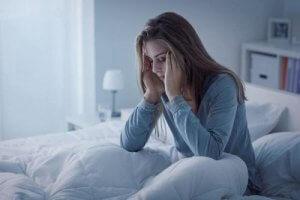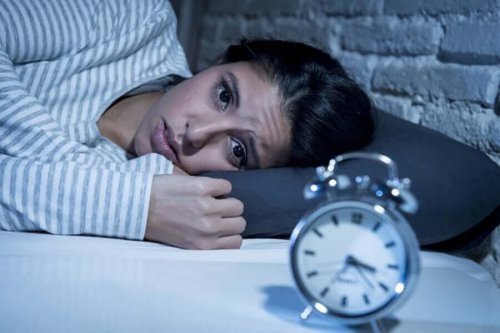Learn All About Dysania

People with dysania have a really hard time getting out of bed in the morning. Although it’s not formally recognized as a condition, it’s used to describe someone who has a really hard time getting up.
Indeed, what separates someone who has dysania from the simple fact of being tired is that they can suffer from anxiety, which makes it extremely hard for them to start the day off right.
Dysania, anxiety about getting out of bed
Many people feel tired, lazy, apathetic, and exhausted when their alarm goes off. However, people with dysania often experience real anxiety in this normal circumstance. Even if those affected sleep for more than the recommended hours, they may find it really hard to get out of bed.
Therefore, this condition is very different from simply being tired. Many people feel exhausted when their alarm goes off early in the morning. Instead of feeling this “frustration” when they get out of bed, those who suffer from this condition feel stressed, anxious, overwhelmed, or even undermined by the idea.

This condition is commonly associated with depression, chronic fatigue syndrome, and other anxiety disorders. People with this condition are often unaware they have a psychological problem. Nonetheless, dysania can be treated with the help of a psychologist and the implementation of some simple actions.
Tips to fight dysania
While there’s no official treatment or cure for dysania, those who suffer from it can take some small steps to try to minimize their symptoms. Below, we’ll share a few tips. So take note!
1. Relaxation
Most adults need six to nine hours of sleep. Relaxation is key, so try to relax before bedtime by taking a relaxing bath or doing light exercises such as yoga stretches.
2. Eliminate distractions
Second of all, don’t forget to eliminate distractions such as cell phones and computers before bed because they negatively affect sleep.
3. Stay well-hydrated
Going to sleep thirsty may affect your sleep quality, which, in turn, may make it harder for you to get up in the morning. Also, don’t forget that proper hydration leads to more energy levels throughout the day.
4. Get more sleep
Finally, try to regulate how much you sleep. Most adults need six to nine hours of sleep. If you have a strict schedule that requires you to arrive at work early, make going to bed early a priority. Conversely, if you work at night, set your alarm an hour or two later each morning, whenever possible.

The symptoms of dysania
If you experience any of the following symptoms, you may be suffering from this condition. We recommend you seek professional help if the above techniques don’t provide any relief:
- You’re obsessed with sleep and this affects your relationships with others.
- You have a really hard time breaking this sleep pattern, no matter how hard you try.
- When you get up, you use any little excuse to stay in bed for a few more minutes.
- When you come home from work, all you want to do is go straight to bed without even having dinner.
- You sleep to escape your emotional ups and downs.
- You’re late to work often because you find it very hard to get out of bed.
- When you come home from work, all you want to do is go straight to bed without even having dinner.
If you feel very tired in the morning and the fact that you need to get up makes you anxious, you should pay special attention to these symptoms and seek professional help.
People with dysania have a really hard time getting out of bed in the morning. Although it’s not formally recognized as a condition, it’s used to describe someone who has a really hard time getting up.
Indeed, what separates someone who has dysania from the simple fact of being tired is that they can suffer from anxiety, which makes it extremely hard for them to start the day off right.
Dysania, anxiety about getting out of bed
Many people feel tired, lazy, apathetic, and exhausted when their alarm goes off. However, people with dysania often experience real anxiety in this normal circumstance. Even if those affected sleep for more than the recommended hours, they may find it really hard to get out of bed.
Therefore, this condition is very different from simply being tired. Many people feel exhausted when their alarm goes off early in the morning. Instead of feeling this “frustration” when they get out of bed, those who suffer from this condition feel stressed, anxious, overwhelmed, or even undermined by the idea.

This condition is commonly associated with depression, chronic fatigue syndrome, and other anxiety disorders. People with this condition are often unaware they have a psychological problem. Nonetheless, dysania can be treated with the help of a psychologist and the implementation of some simple actions.
Tips to fight dysania
While there’s no official treatment or cure for dysania, those who suffer from it can take some small steps to try to minimize their symptoms. Below, we’ll share a few tips. So take note!
1. Relaxation
Most adults need six to nine hours of sleep. Relaxation is key, so try to relax before bedtime by taking a relaxing bath or doing light exercises such as yoga stretches.
2. Eliminate distractions
Second of all, don’t forget to eliminate distractions such as cell phones and computers before bed because they negatively affect sleep.
3. Stay well-hydrated
Going to sleep thirsty may affect your sleep quality, which, in turn, may make it harder for you to get up in the morning. Also, don’t forget that proper hydration leads to more energy levels throughout the day.
4. Get more sleep
Finally, try to regulate how much you sleep. Most adults need six to nine hours of sleep. If you have a strict schedule that requires you to arrive at work early, make going to bed early a priority. Conversely, if you work at night, set your alarm an hour or two later each morning, whenever possible.

The symptoms of dysania
If you experience any of the following symptoms, you may be suffering from this condition. We recommend you seek professional help if the above techniques don’t provide any relief:
- You’re obsessed with sleep and this affects your relationships with others.
- You have a really hard time breaking this sleep pattern, no matter how hard you try.
- When you get up, you use any little excuse to stay in bed for a few more minutes.
- When you come home from work, all you want to do is go straight to bed without even having dinner.
- You sleep to escape your emotional ups and downs.
- You’re late to work often because you find it very hard to get out of bed.
- When you come home from work, all you want to do is go straight to bed without even having dinner.
If you feel very tired in the morning and the fact that you need to get up makes you anxious, you should pay special attention to these symptoms and seek professional help.
All cited sources were thoroughly reviewed by our team to ensure their quality, reliability, currency, and validity. The bibliography of this article was considered reliable and of academic or scientific accuracy.
This text is provided for informational purposes only and does not replace consultation with a professional. If in doubt, consult your specialist.








